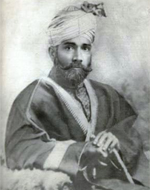Latest
08:47 PM

Writer, journalist and politician, Maulana Zafar Ali Khan belonged to a learned family of Karamabad district, Gujranwala, Punjab. He received his early education in Wazirabad and Patiala.
After completing his intermediate at Aligarh, he joined the postal department of the state of Jammu and Kashmir but resigned over a row with his seniors.
He rejoined the Aligarh College, graduated, and served as private secretary to the vice-chancellor of the college, Nawab Mohsinul Mulk, who sent him to Darul Tarjuman at Hyderabad Deccan. Although he did sizable translation work there, he left for Bombay after developing differences with the Home Secretary of Deccan Nawab Sarbuland.
Maulana Zafar Ali came back to Deccan after going through a series of unsuccessful business ventures in Bombay. He launched the magazine, The Deccan Review, which soon earned him fame.
At that time his father was editor of weekly Zamindar that was being published from Lahore. The weekly played a prominent role in Pagri Sambhal Jutta Movement aimed at asserting the rights of farmers in colonized areas.
Following his father’s death, Maulana Zafar Ali Khan moved to Lahore and took over Zamindar which became mouthpiece for Muslim anti-colonial politics. He joined the All-India Congress Committee and emerged as a fiery and powerful commentator.
While his agitational attitude earned him popularity, it also resulted in multiple incarcerations. During his time in jail, he composed some powerful devotional poetry. During this period he was a bitter critic of the All-India Muslim League. But when the Sangathan/Shuddhi movements began to gain popularity, he started harboring doubts about Congress’ Hindu leadership. And in 1945-46 he was elected to the Central Legislative Assembly as a Muslim League nominee. He was a key agitator in the Shahidgunj Mosque dispute and several other anti-British movements.
Maulana Zafar Ali penned 30 books, including seven collections of poetry, most notably: Baharistan, Nigaristan and Chamanistan. Some of his other well-known works are: Marka-e-Mazhab-o-Science, Ghalba-e-Rum, Sayr-e-Zulmet, and an opera Jang-e-Roos-o-Japan.
Source: The Oxford Companion to Pakistani History
Photo courtesy: http://farzana.wordpress.com/

 Why me?
Why me?If my call is so important to them, why don’t they answer it for 22 minutes?
How come when I want to, but something specific online is the only item out of stock.
When I get into a queue or lane going fast, the moment I get in, it becomes the slowest and refuses to budge.
Read more... | Archives